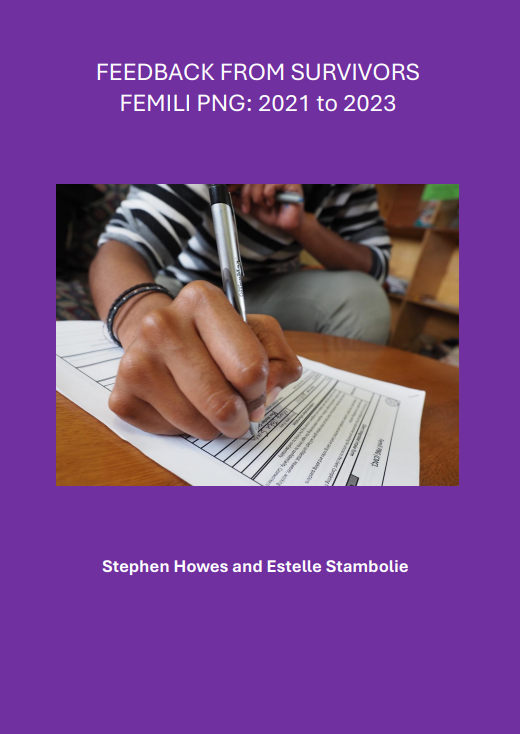A new report by two academics at the Australian National University summarises the main findings from Femili PNG’s client feedback surveys over the last three years, 2021 to 2023.
Femili PNG collects feedback from a sample of its clients through a feedback survey that has been administered since 2016. In 2021, the survey form was expanded and revised. This new report is based on data from that expanded survey over the last three years: 2021 to 2023. It is the third client feedback report to be published: you can find the earlier two here (2016-17) and here (2016-2020).
The report will be launched at the Femili PNG 10th anniversary dinner on August 3 2024.
The full report can be downloaded from the ANU website.

Key findings are summarised below.
Between 2021 and 2023, a total of 111 client feedback interviews were conducted. The sample is largely selected on the basis of convenience, and so is not representative of the broader Femili PNG client base. Nevertheless, the survey, which asks for a mix of quantitative and qualitative responses, generates useful insights.
Basic needs, transport and counselling are the most common services, reported to be received by two-thirds of survivors or more. Restraining orders, emergency accommodation, and relocation are the most important services for those who receive them.
Femili PNG operates one safe house in Port Moresby, and supports other safe houses operated by other NGOs. Only one of the 80 clients supported by Femili PNG in emergency accommodation said they did not feel safe. Most feedback from safe houses is very positive with suggestions often relating to better catering for children in safe houses.
Most survivors who come to Femili PNG want to obtain a restraining order, and 58 of those surveyed said that Femili PNG helped them obtain an Interim Protection Order (IPO). Again, only one said that their IPO did not help keep them safe. While feedback on restraining orders is very positive, some survivors want more information on legal processes.
Femili PNG helps a small number of survivors relocate to an alternative location. 33 of those surveyed said that they were being or had been relocated. All survivors reported that relocation protected or would protect them from further violence. All feedback on relocations was positive.
Half the survivors report that their situation has been fully resolved, and nearly all of the remaining half report at least some improvement. Survivors who are relocated and/or receive emergency accommodation have the greatest likelihood of full resolution. Survivors whose cases are closed due to loss of contact are less likely to report full resolution, and more likely to report a partial resolution.
Femili PNG receives very high satisfaction ratings from survivors, while service providers in general receive lower but still good satisfaction ratings.
Feedback for Femili PNG is very positive with suggestions to increase its reach and operations. Feedback for other service providers includes mixed reviews ranging from deep appreciation for timely assistance to complaints of slow, uncaring, or corrupt service.
Overall, the survey is reassuring in the evidence it provides that those who receive help from Femili PNG find it very useful in protecting their safety, and in either fully or partially resolving the difficult and sometimes life-threatening situation they were in that led them to Femili PNG’s doors.
An effort needs to be made, however, to improve the quality of the client feedback survey. This can be done by closer linking to the Case Management System (CMS), which has records of all clients, by making a greater effort to increase the completion rate for surveys, and by making the survey more representative and independent.
Download the full report here.


